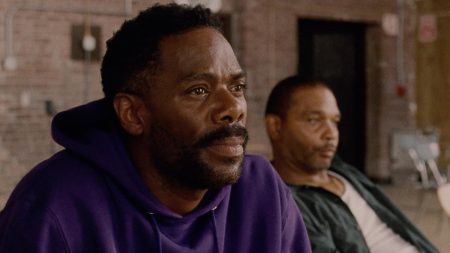A Bizarre Encounter: Kristin Davis Recalls Bill O’Reilly’s Unsolicited Intervention
In a surprising revelation, Kristin Davis, beloved for her role as Charlotte York in Sex and the City, shared a peculiar and uncomfortable encounter with former Fox News host Bill O’Reilly. During an episode of her podcast Are You a Charlotte?, Davis recounted how she once crossed paths with O’Reilly at an event while her iconic HBO series was still airing. What began as a casual interaction quickly turned awkward when O’Reilly expressed his strong disapproval of the show’s creator, Darren Star.
Davis recalled O’Reilly’s fiery remarks: “He said, ‘If I ever see Darren Star, I’m gonna punch him in the face.’” Visibly taken aback, Davis responded, “What’s happening?” O’Reilly’s justification for his outrage was his disapproval of the show’s content, exclaiming, “I can’t believe what he makes you guys do.” Davis, defending her work, calmly replied, “We really love our show… We’re fine.” Despite her polite assertion, O’Reilly continued to berate the series, leaving Davis perplexed.
The conversation took a deeper turn when Davis’s podcast guest, internet personality Blakely Thornton, weighed in on the encounter. Thornton aptly described the interaction as a “microcosm of culture,” noting how O’Reilly, a man with a history of misconduct allegations, positioned himself as a self-appointed protector while criticizing the show’s portrayal of women. Thornton remarked, “Like a crazy misogynist… verbally assaulting you about how they’re going to help you, and you’re like, ‘I’m good.’” Davis agreed, acknowledging the irony of the situation and the eventual consequences O’Reilly faced for his own actions.
This exchange not only highlights the tension between O’Reilly’s conservative values and the progressive themes of Sex and the City but also underscores the broader cultural dynamics at play. Davis’s story serves as a reminder of the challenges women in media often face when their work challenges societal norms, particularly in the face of patriarchal criticism.
The Man Behind the Controversy: Bill O’Reilly’s Troubled Legacy
Bill O’Reilly, once a dominant figure in cable news, hosted The O’Reilly Factor on Fox News from 1996 to 2017. His show was known for its provocative commentary and polarizing rhetoric, often targeting liberal perspectives and cultural shifts. However, O’Reilly’s career was marred by multiple allegations of sexual misconduct, which ultimately led to his downfall.
In 2017, The New York Times reported that O’Reilly and Fox News had paid approximately $13 million to settle lawsuits with several women who accused him of sexual harassment or inappropriate behavior. One of the most damning cases involved former Fox News analyst Lis Wiehl, who alleged that O’Reilly engaged in a nonconsensual sexual relationship with her, during which he subjected her to harassment and shared explicit material. The settlement Wiehl received was a staggering $32 million.
The fallout from these revelations was swift and severe. Advertisers abandoning The O’Reilly Factor led to the show’s cancellation, marking the end of an era for the once-untouchable host. O’Reilly has since attempted to revive his career through a podcast called No Spin News, but his reputation remains tarnished by the serious allegations against him.
Davis’s recollection of O’Reilly’s aggressive criticism of Sex and the City aligns with the pattern of behavior described by his accusers—a man who often used his platform to assert power over women while clutching to outdated, misogynistic views.
A Show Ahead of Its Time: The Cultural Impact of Sex and the City
While Bill O’Reilly’s legacy is marred by controversy, Kristin Davis’s Sex and the City remains a cultural phenomenon that continues to resonate with audiences. The show, which aired on HBO from 1998 to 2004, followed the lives of four women—Carrie, Miranda, Charlotte, and Samantha—as they navigated love, careers, and friendships in New York City.
What set Sex and the City apart was its unapologetic portrayal of women’s lives, including their sex lives, with humor, heart, and a refreshingly honest lens. The show’s frank depiction of nudity and its exploration of themes like empowerment, independence, and female solidarity resonated deeply with women across generations.
The series’ impact extended far beyond the screen. It not only redefined how women’s lives were represented in media but also sparked conversations about feminism, relationships, and identity. The show’s success led to two feature films and, in 2021, a sequel series titled And Just Like That…, which continues to explore the evolving lives of its beloved characters.
For Davis, the encounter with O’Reilly serves as a stark reminder of the cultural resistance the show faced during its run. However, the series’ enduring popularity is a testament to its ability to challenge societal norms and empower women to embrace their individuality.
Reflections on Power and Misogyny: A Broader Cultural Conversation
Kristin Davis’s story, while personal, touches on a broader cultural issue—the tendency of powerful men to assert control over women’s narratives, often under the guise of protection or concern. O’Reilly’s offer to “help” Davis and his condemnation of Sex and the City reflect a larger pattern of misogyny, where women’s agency is questioned and their choices are policed.
Thornton’s observation during the podcast—that O’Reilly’s behavior is a “microcosm of culture”—hits at the heart of this issue. Men like O’Reilly often position themselves as moral authorities, critiquing women’s choices while ignoring their own hypocrisy and misconduct. This dynamic is not unique to O’Reilly; it is a systemic issue that transcends industries and societal spheres.
The intersection of Davis’s experience with O’Reilly and the broader cultural narrative of Sex and the City underscores the importance of representation and female empowerment. The show’s refusal to conform to societal expectations of women’s behavior was a radical act in itself, challenging viewers to rethink outdated norms and embrace a more progressive understanding of femininity.
In sharing her story, Davis not only highlights the personal absurdity of her encounter with O’Reilly but also contributes to a larger conversation about power, consent, and the ongoing fight for women’s rights.
The Fall of a Media Titan: Bill O’Reilly’s Downfall and Its Aftermath
Bill O’Reilly’s downfall serves as a cautionary tale about the consequences of unchecked power and systemic toxicity. His tenure at Fox News was marked by both professional success and personal scandal, with multiple women coming forward to accuse him of misconduct.
The 2017 New York Times exposé detailing the payouts to O’Reilly’s accusers marked a turning point in his career. The public backlash was immediate, with advertisers fleeing his show and Fox News ultimately deciding to sever ties with him. Despite his efforts to revive his career through podcasting, O’Reilly’s reputation remains irreparably damaged.
The fallout from O’Reilly’s actions also shed light on the toxic culture at Fox News, where allegations of harassment and misconduct were often swept under the rug. His case, along with others like former CEO Roger Ailes, highlighted the need for greater accountability in media and beyond.
For Kristin Davis, the encounter with O’Reilly is a reminder of the challenges women face when asserting their autonomy in spaces dominated by men. Her story, and the broader context of O’Reilly’s downfall, serves as a powerful reminder of the importance of speaking out against misconduct and advocating for a more equitable society.
Conclusion: A Tale of Two Worlds—Empowerment and Misogyny
Kristin Davis’s recollection of her encounter with Bill O’Reilly is a tale of two worlds colliding. On one hand, there is the progressive, empowering realm of Sex and the City, which celebrated women’s independence and challenged societal norms. On the other, there is the toxic, misogynistic worldview of O’Reilly, who sought to exert control over women’s narratives while hiding his own misdeeds.
Davis’s story is not just a personal anecdote; it is a microcosm of a larger cultural struggle. It reflects the tension between those who seek to empower women and those who aim to silence or control them.
As Sex and the City continues to inspire new generations of women, its legacy stands in stark contrast to the destructive behavior of figures like O’Reilly. The show’s enduring success is a testament to the power of storytelling and the importance of challenging outdated norms.
In the end, Davis’s encounter with O’Reilly is a reminder that progress is not always linear, but the fight for equality and justice remains as relevant as ever.















